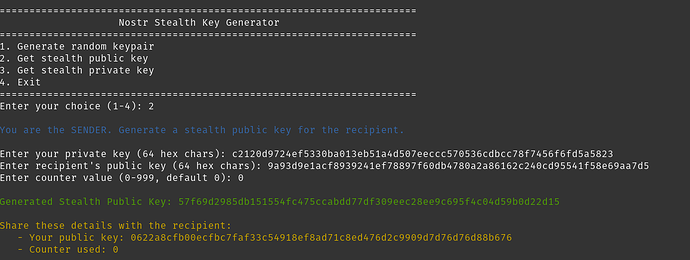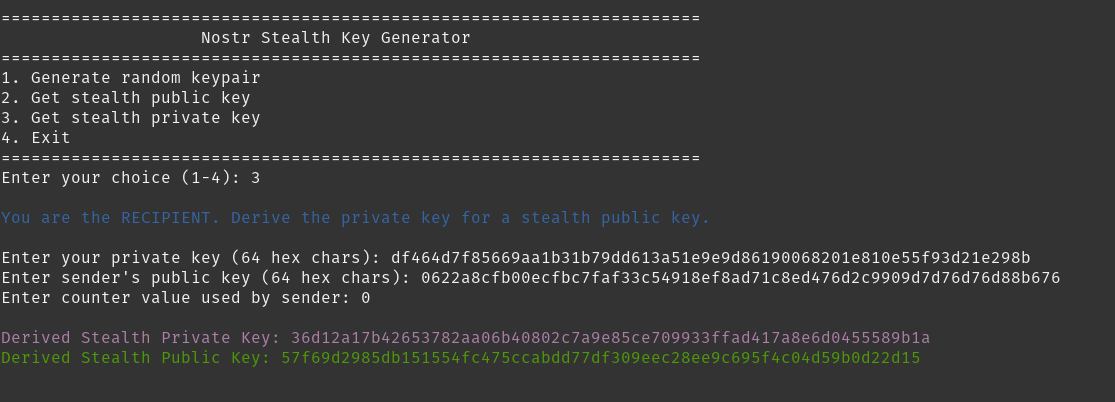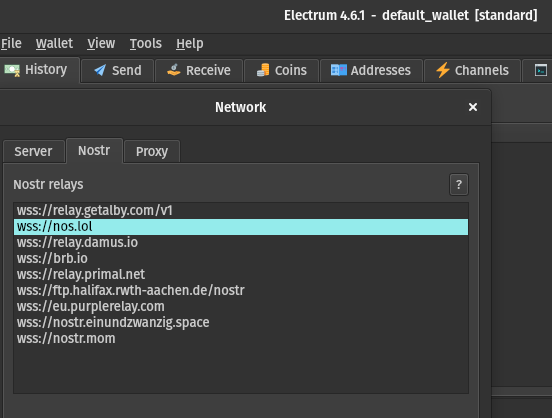Nostr uses the same cryptography to generate keys as bitcoin. So, users can generate new keys from npub and receive bitcoin payments.
Motivation
- BIP 47 v1 uses OP_RETURN for notifications
- Silent payments scanning affects UX
Protocol
Alice would generate a new key for Bob and share the notification as encrypted message using NIP-17. Bob’s wallet will save the details to receive payments from Alice in future. Alice will get a new address for Bob by incrementing counter.
A BIP or NIP could be written to describe the specifications and below is a proof of concept:
Proof of Concept
#!/usr/bin/env python3
import hashlib
import hmac
import secrets
import json
import os
from typing import Tuple, Optional
from nostr.key import PrivateKey, PublicKey
import coincurve
class NostrKeyGenerator:
def __init__(self, private_key_hex: str):
if len(private_key_hex) != 64:
raise ValueError("Private key must be 64 hex characters")
try:
private_key_bytes = bytes.fromhex(private_key_hex)
self.private_key = PrivateKey(private_key_bytes)
self.public_key = self.private_key.public_key
except ValueError:
raise ValueError("Invalid hex string for private key")
def get_private_key_hex(self) -> str:
return self.private_key.hex()
def get_public_key_hex(self) -> str:
return self.public_key.hex()
def compute_shared_secret(self, other_public_key_hex: str) -> bytes:
shared_secret = self.private_key.compute_shared_secret(other_public_key_hex)
if isinstance(shared_secret, bytes):
return shared_secret
else:
return bytes.fromhex(shared_secret)
def generate_stealth_public_key(self, recipient_public_key_hex: str, counter: int = 0) -> str:
shared_secret = self.compute_shared_secret(recipient_public_key_hex)
counter_bytes = counter.to_bytes(4, 'big')
key_factor = hmac.new(shared_secret, counter_bytes + b"stealth", hashlib.sha256).digest()
recipient_key_bytes = bytes.fromhex('02' + recipient_public_key_hex)
recipient_point = coincurve.PublicKey(recipient_key_bytes)
factor_private_key = coincurve.PrivateKey(key_factor)
factor_point = factor_private_key.public_key
combined_point = recipient_point.combine([factor_point])
compressed_pubkey = combined_point.format(compressed=True)
return compressed_pubkey[1:].hex()
def derive_stealth_private_key(self, sender_public_key_hex: str, counter: int = 0) -> Tuple[str, str]:
shared_secret = self.compute_shared_secret(sender_public_key_hex)
counter_bytes = counter.to_bytes(4, 'big')
key_factor = hmac.new(shared_secret, counter_bytes + b"stealth", hashlib.sha256).digest()
factor_int = int.from_bytes(key_factor, 'big')
my_private_int = int(self.private_key.hex(), 16)
secp256k1_order = 0xFFFFFFFFFFFFFFFFFFFFFFFFFFFFFFFEBAAEDCE6AF48A03BBFD25E8CD0364141
new_private_int = (my_private_int + factor_int) % secp256k1_order
new_private_bytes = new_private_int.to_bytes(32, 'big')
new_private_key = PrivateKey(new_private_bytes)
new_public_key = new_private_key.public_key
coincurve_private = coincurve.PrivateKey(new_private_bytes)
coincurve_public = coincurve_private.public_key
compressed_pubkey = coincurve_public.format(compressed=True)
return (new_private_bytes.hex(), compressed_pubkey[1:].hex())
def validate_hex_key(key_hex: str, key_type: str, expected_length: int) -> bool:
if len(key_hex) != expected_length:
print(f"Error: {key_type} must be {expected_length} hex characters")
return False
try:
bytes.fromhex(key_hex)
return True
except ValueError:
print(f"Error: {key_type} must be valid hex")
return False
def generate_stealth_public_key():
print("\n\033[34mYou are the SENDER. Generate a stealth public key for the recipient.\033[0m")
print()
sender_private = input("Enter your private key (64 hex chars): ").strip()
if not validate_hex_key(sender_private, "Private key", 64):
return
recipient_public = input("Enter recipient's public key (64 hex chars): ").strip()
if not validate_hex_key(recipient_public, "Public key", 64):
return
try:
counter = int(input("Enter counter value (0-999, default 0): ").strip() or "0")
if counter < 0 or counter > 999:
print("Counter must be between 0 and 999")
return
except ValueError:
print("Counter must be a number")
return
try:
keygen = NostrKeyGenerator(sender_private)
stealth_pubkey = keygen.generate_stealth_public_key(recipient_public, counter)
print(f"\n\033[32mGenerated Stealth Public Key: {stealth_pubkey}\033[0m")
print()
print("\033[33mShare these details with the recipient:\033[0m")
print(f"\033[33m - Your public key: {keygen.get_public_key_hex()}\033[0m")
print(f"\033[33m - Counter used: {counter}\033[0m")
except Exception as e:
print(f"Error generating stealth public key: {e}")
def derive_stealth_private_key():
print("\n\033[34mYou are the RECIPIENT. Derive the private key for a stealth public key.\033[0m")
print()
recipient_private = input("Enter your private key (64 hex chars): ").strip()
if not validate_hex_key(recipient_private, "Private key", 64):
return
sender_public = input("Enter sender's public key (64 hex chars): ").strip()
if not validate_hex_key(sender_public, "Public key", 64):
return
try:
counter = int(input("Enter counter value used by sender: ").strip())
if counter < 0 or counter > 999:
print("Counter must be between 0 and 999")
return
except ValueError:
print("Counter must be a number")
return
try:
keygen = NostrKeyGenerator(recipient_private)
stealth_private, stealth_public = keygen.derive_stealth_private_key(sender_public, counter)
print(f"\n\033[95mDerived Stealth Private Key: {stealth_private}\033[0m")
print(f"\033[32mDerived Stealth Public Key: {stealth_public}\033[0m")
print()
except Exception as e:
print(f"Error deriving private key: {e}")
def generate_random_keypair():
private_key_bytes = secrets.token_bytes(32)
private_key = PrivateKey(private_key_bytes)
print(f"\nPrivate Key: {private_key.hex()}")
print(f"Public Key: {private_key.public_key.hex()}")
print()
def main():
while True:
print("\n" + "="*70)
print(" Nostr Stealth Key Generator")
print("="*70)
print("1. Generate random keypair")
print("2. Get stealth public key")
print("3. Get stealth private key")
print("4. Exit")
print("="*70)
choice = input("Enter your choice (1-4): ").strip()
if choice == "1":
generate_random_keypair()
elif choice == "2":
generate_stealth_public_key()
elif choice == "3":
derive_stealth_private_key()
elif choice == "4":
break
else:
print("Invalid choice, please try again")
if __name__ == "__main__":
main()


